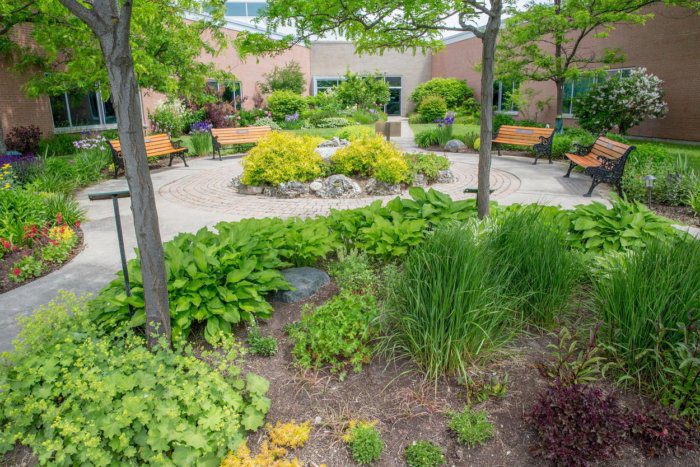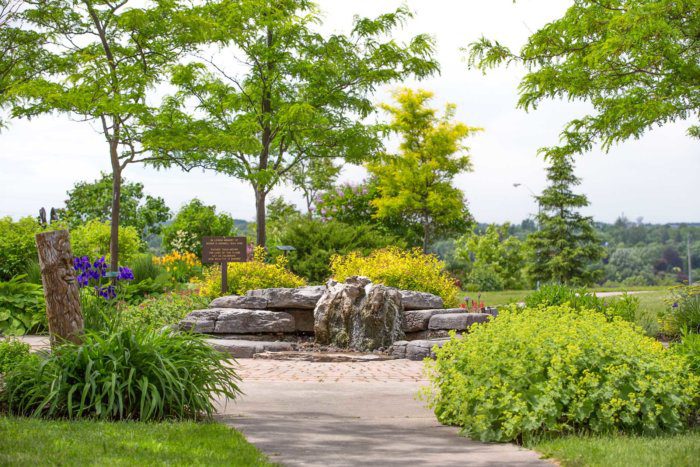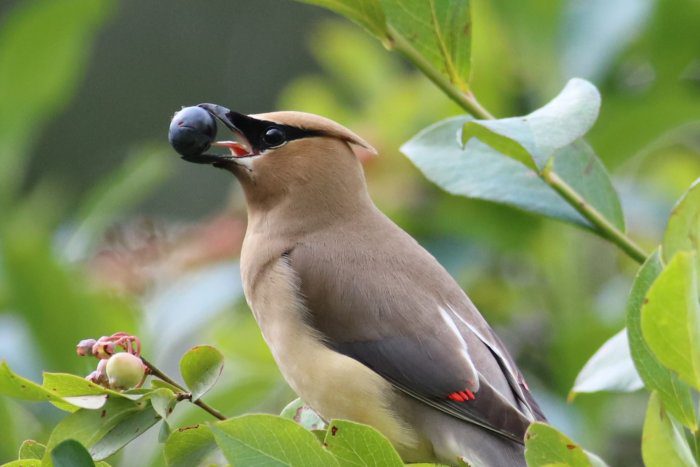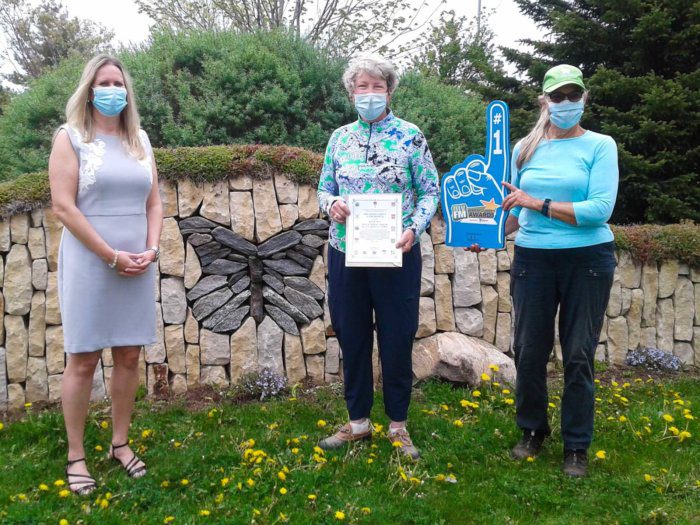Posted : July 6, 2021
Our blog is chock full of great ideas for fun things to see and do in York Durham and Headwaters. We are always adding new content and updating old posts, but sometimes you might stumble upon something from our vault. If this article has inspired you to hit the road, be sure to double-check that the featured stops in this post are still welcoming visitors.
A garden is a place of healing. It is a place of renewal and life and beauty. Gardens line our walkways and add colour and vitality to our public parks. We even photograph and paint them, and then hang their likenesses on our walls in our homes. With all the benefits to the soul that gardens offer, it is surprising that our hospitals don’t have more of them—especially when these are the facilities that need them most. At Headwaters Health Care Centre, a group of volunteers have come together to remedy this. Today, this centre for health and healing is home to the Friendship Gardens, a multi-dimensional project which benefits the entire community across generations.

The Friendship Gardens were started over twenty years ago when the hospital was first built. But because there wasn’t enough funding to purchase necessary equipment at the time, plans were put on hold. A year later, when Lynn Sinclair Smith discovered the reason for the gardens not progressing, she took matters into her own hands by reaching out the CEO of Headwaters Health directly. “I was granted permission to build and maintain one garden with the help of some friends, and was given my choice of anywhere within the property,” she recalls. “I chose what we now call the “Fountain Garden” as our first garden, though it was intended to be the one and only garden at the time. We did everything—the sidewalks, electrical and the water.”
Once it was finished, Lynn and her co-volunteers were surprised when staff, patients and even visitors began asking when the next garden was going to be built. Learning from their first experience, they dove into the “Arbour Garden.” “With the first garden, I hadn’t planned on anything other than trees for sun protection, and we planted younger trees to let them grow into the property and adapt,” Lynn explains. “At one point, as we completed the garden, we realized it was going to be a few years before these trees could provide shade for people—especially patients who were on medications that were sun reactive.” To account for this, the volunteers created an arbour with two wings to allow enough room for patients, family and staff to sit together.

Today, Headwaters Health Care Centre is home to a network of gardens that aren’t just pretty to look at, they’re also environmentally proactive. For example, cedar waxwings are a type of bird that are frequently seen in fruiting trees. Because the Friendship Gardens have berry trees, there are now approximately 30 cedar waxwings that call these gardens home. Additionally, large portions of the unproductive lawn surrounding the hospital has now been cultivated with native plants. Much of the knowledge that volunteers gained was learned on-the-job, and they are so proud of their achievement that several have “adopted” the gardens they’ve helped to install. “We really encourage an adoptive program, because then you’re responsible for it from start to finish in the season,” Lynn says. “If you’re in need of any help, we’re willing to pitch in and help. Anything that needs to be purchase is purchased and we will maintain and sustain it.”

It should come as no surprise that building and maintaining a network of gardens this large and this important relies not only on volunteer labour, but also on donations. Of course, the Headwaters Health Care Centre provides the budget for what Lynn refers to as infrastructure—with over 500 trees on the property, maintenance is a large chunk of the funding. And recently, the garden was also able to take advantage of a federal grant which allowed for 500 new saplings to be installed. But for the bulk of the work and fundraising initiatives, it’s down to the effort and time of men and women who are not paid for their selflessness—except by the value of personal satisfaction. “Our volunteers tend to have their own personal likes,” Lynn says. “Some prefer meticulous gardens while others like more natural ones where weeds definitely grow. Others are just happy to be involved with any activity, and others still prefer to donate products or money. It’s all good. It all comes together and just works.”
The result is that the Friendship Gardens at Headwaters Health Care Centre are gardens with a lot of personal history. The “Healing Wheel” garden stands as a monument to the 80 volunteers from the community who came together to learn how to build a drystone wall. And there is a pollinator garden that was the idea of a group of students from the University of Guelph, and which was built by a group of high school volunteers. The Friendship Gardens are so much more than flowers and plants and landscaping. They are the evidence of community spirit and community involvement.

“It’s interesting,” Lynn says. “When we started this, it was about the patients. I was thinking specifically of sick patients who needed a place like this. But over the years, I’ve had people tell me that all of their kids were born here. There is even one young man who is now about 6 foot 4 who was born here at this hospital. I have a photo of him as a little baby in his mother’s arms. To me, it’s a real cycle of life. We have people here for sad reasons, and often I’m told that the last thing their loved ones saw was our gardens. But we also have people who say this is a wonderful place because it’s where their children were born.”
Then there are the hospital staff, who spend more time on the grounds than they do in their own homes. These gardens, Lynn points out, are important to them, and their story has opened her eyes to how broad a selection of people there are who benefit from what she and her co-volunteers have accomplished. She says, “When the staff are inside looking out, or if they’re able to slip out and take a break, these gardens have a huge impact on them.”
If you find yourself on the grounds of the Headwaters Health Care Centre, don’t forget to visit the Friendship Gardens for your daily dose of healing and renewal. To learn more, or to find out what initiatives are going on currently, visit www.friendshipgardens.ca.
Friendship Gardens
Headwaters Health Care Centre
100 Rolling Hills Dr., Orangeville
Story by Katherine Ryalen